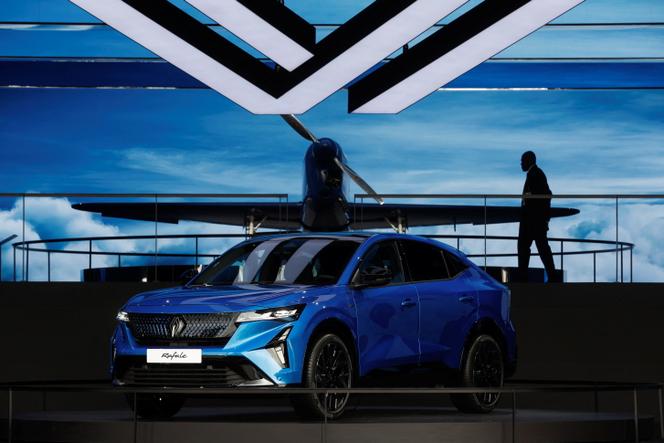


For years, the narrative has been clear: Hybrid vehicles, combining an internal combustion engine with an electric motor, are a kind of transitional technology. They are intended to smooth the transition from fully gasoline-powered cars to entirely electric cars before fading away. However, their lease seems to be up for renewal, at least for the near future.
Questions are emerging regarding the pace of sales growth of fully electric models, fuelling a wait-and-see attitude that is favoring hybrids. In this context, many car manufacturers are turning to hybrids as a reliable option, particularly the traditional hybrid models, which are more efficient than micro-hybrids and more cost-effective than heavy plug-in hybrids. Those who were already predicting the hybrid's rapid decline in the face of the inexorable rise of the electric car are in for a rude awakening.
"I owe Toyota an apology," admitted Adam Jonas, automotive market analyst at Morgan Stanley, in February. The expert said he was convinced that the world's number one automaker, which has been the driving force behind hybrids since 1997 and has often been criticized for its limited commitment to electric cars, was on the wrong track. By 2023, worldwide sales of hybrid models had risen from 3.9 million to 4.2 million (mostly Toyotas).
In France, these vehicles accounted for 36.7% of registrations in the first two months of 2024, a jump of 4.8% in one year, while the market share of electric cars (17.3%) grew by 2.9% over the same period. Particularly economical in urban areas, these vehicles have been massively adopted by taxi services.
While Toyota and, to a lesser extent, Renault and Hyundai dominate the European hybrid market, Ford and General Motors (GM), who swore by all-electrics, have announced that they are delaying some of their investments in this area, and will give more space to hybrids, which they had previously neglected. In the United States, Ford expects its hybrids to grow by 40% in 2024.
"We thought we were further ahead" in the transition to electric vehicles, admitted GM CEO Mary Barra. Land Rover is doing the same and has postponed the release of its planned battery-powered models. At the Geneva International Motor Show (February 26-March 3), the Chinese SAIC group unveiled the MG3 hybrid model, which will sell for about €20,000. This will enable it to compete directly with the Renault Clio and Toyota Yaris, whose hybrid versions have been a success. In short, hybrids are on a roll. Since the beginning of the year, Tesla's share price has plunged by 18%, while Toyota's has gained 39%.
There are a number of reasons why the current climate is so favorable to hybrids. Despite the price war that has been going on for almost a year, the price of electric cars remains high, even prohibitive. Cuts in government incentives (in France, the electric rebate has been reduced from €5,000 to €4,000), or even their outright disappearance in Germany, don't help matters.
Furthermore, the low-cost models announced by manufacturers are not yet available, while the expected progress on batteries, and therefore range, has been slow to materialize. Finally, the risk that the outcome of the next European and American elections will result in public policies that are much less favorable to the energy transition is weighing on the general climate.
Having sold a first generation of all-electric models to a clientele committed to the idea of an electrified future, automakers are now faced with the challenge of attracting a more skeptical group of buyers. In these conditions, they aren't hesitant to promote their hybrids, which are more expensive than a vehicle with a conventional combustion engine but more affordable than an electric car. It's also not lost on them that the profitability of a hybrid is significantly higher.
"Hybrids appear to be the simplest solution for lowering a manufacturer's average CO2 emissions, but they're also the most pragmatic way of getting as far ahead as possible with regard to regulatory standards and preparing for the future with confidence," said Grégory Nève, spokesman for Nissan France. Over the past two years, Nissan has sold more than 100,000 Qashqai and X-Trail models in Europe, featuring the original e-Power system, in which the internal combustion engine does not drive the wheels, but recharges a buffer battery that powers an electric motor.
Apart from Toyota and Nissan, the success of the hybrid looks like revenge for Japanese carmakers, which, from Honda to Suzuki to Mazda, have favored this technology over pure electric. Should we believe Toyota president Akio Toyoda when he claims, against the general opinion, that electric cars will never surpass the 30% mark in global market share?
According to Jamel Taganza, a partner at Inovev, we shouldn't be too hasty: "Hybrid sales will continue to gain market share, but this will be at the margin, due in particular to the attenuation of Euro 7 standards, which make it less imperative to hybridize combustion engines. Eventually, the pace of growth for electrics will be steadier."
The automotive industry's top executives, none of whom openly question the eventual prospect of full electrification of the car market, agree with this analysis. However, Luca de Meo, president of the European Automobile Manufacturers' Association, has sensed that the current situation could be an argument in favor of relaxing the European Union's planned 2035 ban on the sale of fossil fuel-powered cars – including hybrids. In an interview with Agence France-Presse, Renault's CEO suggested that the ban "should apply a little later."
Translation of an original article published in French on lemonde.fr; the publisher may only be liable for the French version.
